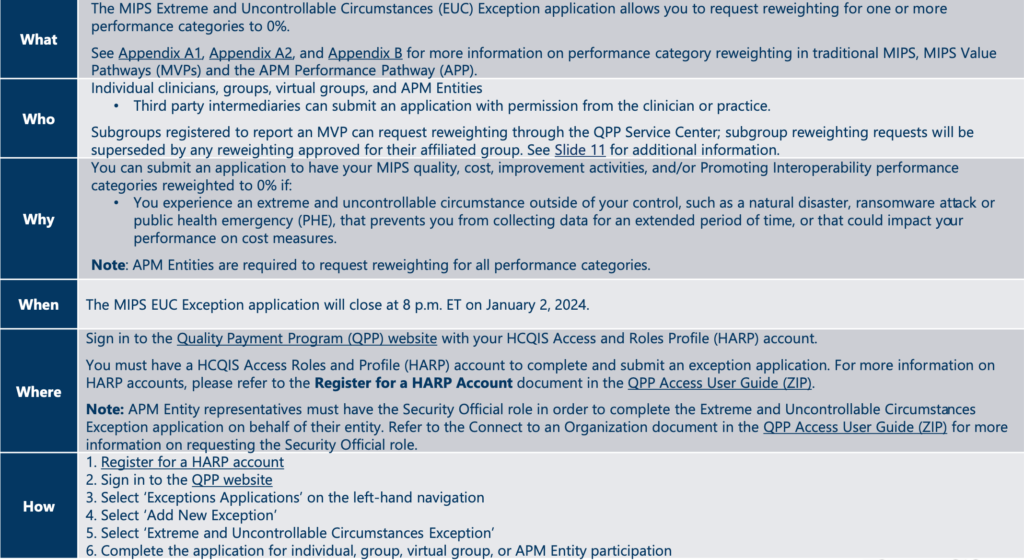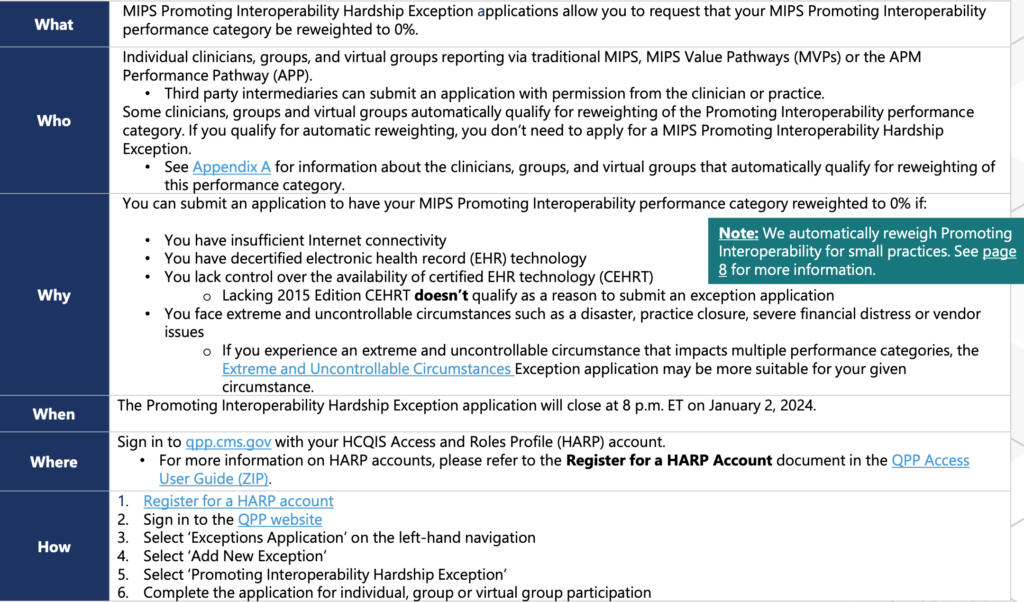While collecting data for MIPS over the course of a Performance Year, it’s possible that you or your practice may encounter circumstances that make it impossible to meet MIPS program requirements. To combat this, CMS has implemented two types of exceptions for your submission, allowing you to apply for a reweighting of some or all Performance Categories.
- MIPS Extreme and Uncontrollable Circumstances (EUC) Exception
- MIPS Promoting Interoperability Performance Category Hardship Exception
Extreme and Uncontrollable Circumstances (EUC) Hardship Exception
The MIPS Extreme and Uncontrollable Circumstances (EUC) Exception application allows eligible clinicians, groups, and virtual groups to request reweighting for any or all performance categories if they encounter an extreme and uncontrollable circumstance that is outside of their control (e.g., natural disaster, malware, medical issues, etc.). Clinicians that register to report a MIPS Value Pathway (MVP) as a subgroup will inherit any reweighting approved for their affiliated group. Below is an overview of this exception type:

According to CMS, an ‘extreme and uncontrollable’ circumstance would cause the following:
- The inability to collect information necessary to submit for a MIPS performance category
- The inability to submit information that would be used to score a MIPS performance category for an extended period (ex. You are unable to collect data in a specific category for three months)
- An impact to your normal processes, affecting your performance on cost measures and other administrative claims measures
In certain circumstances, the EUC may be applied automatically. MIPS clinicians in CMS-identified regions affected by major events in 2023 (such as a FEMA-designated major disaster) may automatically be granted an exception. Affected clinicians will have all 4 performance categories reweighted to 0% in their final score, unless they submit data for 2+ categories. If eligible, the automatic exception overrules any application-based adjustments. The automatic extreme and uncontrollable circumstances policy doesn’t apply to group, virtual group, or APM Entity participation.
COVID-19
For the 2023 performance year, CMS continues to use the MIPS EUC Exception policy to allow clinicians, groups, virtual groups, and APM Entities to submit an application requesting reweighting of MIPS performance categories due to COVID-19.
Extreme and Uncontrollable Circumstances (EUC) Exception applications for the 2023 Performance Year are currently open, and the deadline to apply is January 2, 2024 at 8pm EST.
Promoting Interoperability Performance Category Hardship Exception
The MIPS Promoting Interoperability Performance Category Hardship Exception application allows eligible clinicians, groups, and virtual groups to request reweighting specifically for the Promoting Interoperability performance category. You may qualify for a reweighting of the Promoting Interoperability performance category (to 0%) if you meet certain criteria. Below is an overview of this exception type:

Using a certified electronic health record technology (CEHRT) that meets the 2015 Edition Cures Update certification criteria is required for participation in the Promoting Interoperability performance category PY2023. Lacking the required CEHRT does not qualify you for reweighting. However, hardship exceptions may be granted for the following reasons:
- You have decertified EHR technology
- You have insufficient Internet connectivity
- You face extreme and uncontrollable circumstances such as a disaster, practice closure, severe financial distress, or vendor issues
- You lack control over the availability of CEHRT
Certain clinician types and special status designations will have their Promoting Interoperability performance category reweighted to 0% in all cases.
- Clinician Types: clinical social workers, physical therapists, occupational therapists, qualified speech-language pathologists, qualified audiologists, clinical psychologists, and registered dieticians or nutrition professionals
- Special Status: ambulatory surgical center (ASC)-based, hospital-based, non-patient-facing, and small practice
If you fit into one of these categories, you are exempt from reporting PI data for the 2023 Performance Year, the PI performance category will automatically be reweighed to 0%, and you will not need to apply for this application.
Promoting Interoperability Performance Category Hardship Exception applications for the 2023 Performance Year are currently open, and the deadline to apply is January 2, 2024 at 8pm EST.
Applying for a Hardship Exception
To apply for either type of Hardship Exception, you must have a Health Care Quality Information System (HCQIS) Access Roles and Profile (HARP) account, sign into the QPP website, select ‘Exception Applications’ and then ‘EUC Exceptions’ or ‘Promoting Interoperability Exception’. You can learn more about creating a HARP account from the QPP Access User Guide.
You’ll be notified via email if your application is approved or denied, or you can check the status of your request on the QPP website. If approved, the score will be reweighted to 0% and you won’t have to report for the approved MIPS category or categories but will still be able to submit data in other categories. Please keep in mind that submitting data for any of the reweighted categories will override the exception, and you will be scored as normal.
The deadline to apply for either Hardship Exception is January 2, 2024 at 8pm EST.
If you’d like to know more about QPP exceptions, you can view all the details at the CMS website. You can also register for HCIS’ webinar on the Quality performance category.
